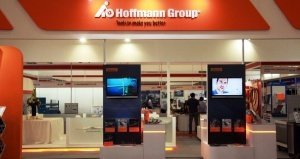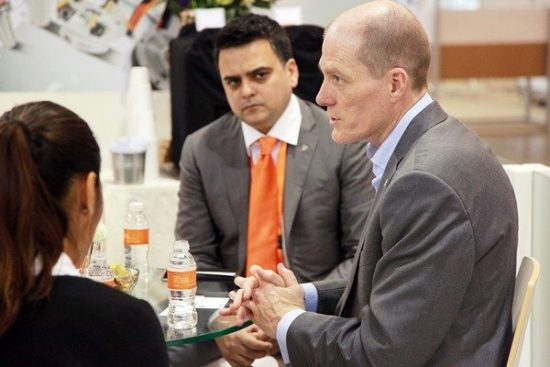
Staying Localised & Responsive In The Internet Of Things
Staying Localised & Responsive In The Internet Of Things
Dr Robert Blackburn, chairman of the board of executive directors and chief executive officer at Hoffmann Group and Pinaki Banarjee, managing director, Hoffmann Asia Pacific and India, share their insights with APMEN on how to stay ahead in today’s increasingly digitised world.
The potential for value creation can be found when technological innovations give rise to new business models that provide efficient solutions with timely delivery. More companies like metalworking tool provider Hoffmann Group are subsequently putting resources to increase responsiveness in digital channels.
Q: Dr Blackburn, with experience in leading companies in the move towards digitalisation, how do you plan to improve Hoffmann Group in this aspect?
Dr Robert Blackburn (RB): In terms of digitalisation, we are continuously improving. Four principles are crucial for our digital channels:
First and foremost: Fewer clicks are better. The easier it is for our customers to use our digital channels, the better. Secondly, we thrive for full integration of our website and our electronic catalogue so that customers will find everything they are looking for as quickly as possible.
The third thing is: We will integrate some of the expertise that our sales team in the field offers to our customers in human form into our digital channels. Our consultants will be able to use the new medium to show their ‘face’ to the customer on the website.
The fourth thing, which is fundamental for Hoffmann: We appreciate our customers and also our suppliers. Our suppliers need to be able to have access to their parts in the catalogue and they need to be able to check their own data to make sure that it works. We will add that functionality for them.
Obviously, underpinning all of this is a proper cybersecurity concept. Data protection is especially important and a big deal for us, as a German company.
Q: How would you encourage companies in South East Asia to move towards Industry 4.0?
RB: My advice to companies is to start very small and pragmatically in this direction, and to start in the very core of their business. If they only try to apply the technology available to the edges of their business, they will not develop in the technology the way the industry needs it.
Pinaki Banerjee (PB): This applies specifically for smaller businesses which exist in Asia. What customers are looking for now is a reliable supplier who can consolidate all the tools and offer it in a transparent manner, and that is what we offer with our own brands Garant and Holex.
Q: In terms of logistics, how is Hoffmann looking to improve this aspect?
RB: The logistics operation is to us foremost a clear and unique selling proposition. We are about to invest a substantial sum in an advanced logistics site in Nuremberg in Southern Germany. It is a Lighthouse project, called LogisticCity. This will enable us to deliver anywhere in Europe within 24 hours.
Furthermore, combined with our warehouse and storage facilities in Malaysia and Singapore it will enable us to deliver within 48 hours to anywhere in Asia. LogisticCity is designed to support our growth ambitions until 2030.
Q: Which areas will the company set its business priorities? What are some potential challenges?
RB:We have a very clear strategy of what we do and what we do not want to do. We don’t want to dominate the whole Asian market. Instead, we concentrate on local markets and focus on customers who value our business proposition. For example, the small metalworking shops.
And, as a guiding principle: Wherever we do business, we do it in our customer’s language. Our corporate culture starts and ends with our customers. That means we offer our print catalogue and our digital catalogue in 11 local Asian languages.
Our core business model built around the system of tools is made both for the traditional world and the new Internet of Things. For example, a worker can leave the machine and walk over to our Tool 24 Smartline cabinet. It knows what kind of tool the worker is looking for and opens the drawer for him, presents the tool to him, and then the software registers what he takes. It then informs the procurement department on what needs replacement, so we can automatically replenish.
PB: What is becoming more and more important in the Asian markets is our consultative services. Usually, a distributor would present its product catalogue and take orders from the customers. We offer a comprehensive consultative sales model that is valued by our customers.
Q: What are some industry-wide metalworking trends in Singapore and Southeast Asia? How is your company going to take advantage of this?
PB:We have to isolate the markets here, as Singapore is very different from Thailand and Vietnam. Focussing on Asia Pacific, we see the oil and gas industry recovering. This had a huge impact in Malaysia, especially in Johor, as the companies are receiving more contracts.
On the manufacturing side, labour costs have escalated in China, which has not yet happened in Vietnam. In Vietnam, there is a pool of young talents who are educated and qualified. That is why you see many factories moving to Vietnam. The semiconductor industry is really growing, and we have seen some very positive developments on the aviation sector. This industry is looking for premium tools and values quality in each and every respect.
RB: If you look at it from a global perspective, I am convinced that Singapore and Southeast Asia will return to the centre of the economic world. At Hoffmann, we don’t plan in years, we plan in decades. We will do business here for at least the next 25 years. So, it is a strategic market for us.

With a substantial sum about to be invested in an advanced logistics site in Nuremberg in Southern Germany, Dr Robert Blackburn (right) and Pinaki Bannarjee (centre) believe that logistics operation is a clear and unique selling proposition.

An intelligent tool cabinet for automated tool dispensing allows for the professional and transparent monitoring of tools.
CHECK OUT THESE OTHER ARTICLES
● Bystronic On Flexible Automation
● Hypertherm Releases Major Version Update Of Robotmaster Robot Programming Software
● Makino Strengthens Presence In Vietnam With New Technology Centre
● Tornos Opens New Customer Center In Bangkok
● The Recipe For Centennial Success
● Gartner 2019 CIO Agenda Reveals Scaling Of Digitalisation In APAC
● TÜV SÜD And thyssenkrupp Innovations Sign MoU To Develop Additive-Manufacturing-Enabled Eolutions In APAC
● Siemens MindSphere on Microsoft Azure Stack Goes Live in Singapore MindSphere Application Center
● Sandvik Opens Coiled Tubing Line In China, Ensuring Fast Deliveries In Asia
● Renishaw Shares Outlook On Vietnam And Philippines
WANT MORE INSIDER NEWS? SUBSCRIBE TO OUR DIGITAL MAGAZINE NOW!
FOLLOW US ON: LinkedIn, Facebook, Twitter
